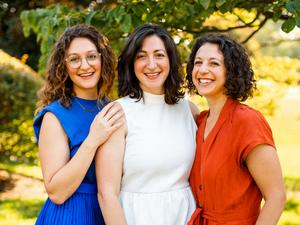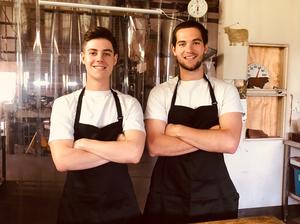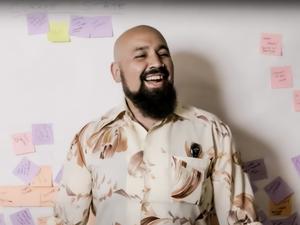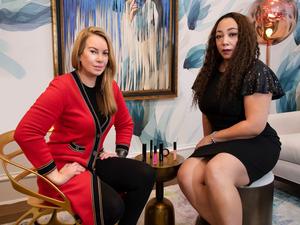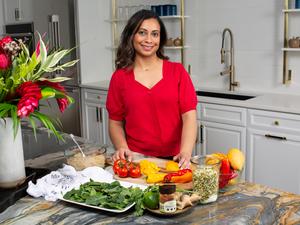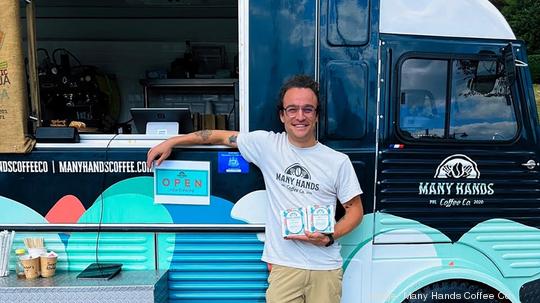
Miles Butler fell in love with café culture a few times. After stints at other organizations, he found himself harkening back to coffee shops, so in 2017 he finally decided to open his own by way of Germantown Espresso Bar, along with business partner Jeff Podlogar.
After several years in business, they and a group of investors launched a new venture, Many Hands Coffee Co. Through the coffee roasting operation, the owners are reimagining the traditional approach to the industry with a focus on the triple bottom line. Not yet 2 years old, the business is projecting as much as 50% year-over-year growth next year and eyeing expansion plans down the line.
When Butler and Podlogar launched Many Hands, the focus on social and environmental impact, along with fair wages for workers, were nonnegotiables. Known as the triple bottom line, the organization looks to create positive community impact in addition to generating revenue.
For Butler, that ethos goes back to childhood. Growing up in Northwest Philadelphia, he attended Oak Lane Day School in Blue Bell and later graduated from Abington Friends School in Jenkintown. Along with his family, environmental and social responsibility were instilled in him from an early age.
When it came time to launch a business, he knew those had to be front and center.
But launching a business wasn’t always what Butler thought he would do. After Abington Friends, he attended Temple University, but found that it wasn’t the right fit and so pursued his education in the real world. Living in Boston for a time, he developed an interest in the coffee industry while working at a café.
“That's where I started really diving into the history of coffee and coffee shops and the community connecting points…,” he said.
After Boston, Butler stayed in Portland, Oregon, while his band, indie folk outfit the Breaking Yard, was on break between tours. For several months he worked simultaneously at several coffee shops there.
After the band broke up, Butler returned to Philadelphia and gravitated toward the hospitality industry, working at Pure Sweets & Co. in Rittenhouse Square. “I realized, oh, this is what I’m supposed to be doing on this planet,” he said.
Despite his passion for coffee, an opportunity to work at Philadelphia apparel brand United By Blue presented itself. While there, he met Podlogar and the two began dreaming up what would become Germantown Espresso Bar, which is located at 26 Maplewood Mall.
After just a few years in business, the two began discussing plans for a coffee roasting operation.
“Jeff and I have always been really passionate and curious about the journey from seed to cup, and we wanted to be able to have as much control over the supply chain as possible without spending thousands [of dollars] to go to these places around the world,” Butler said.
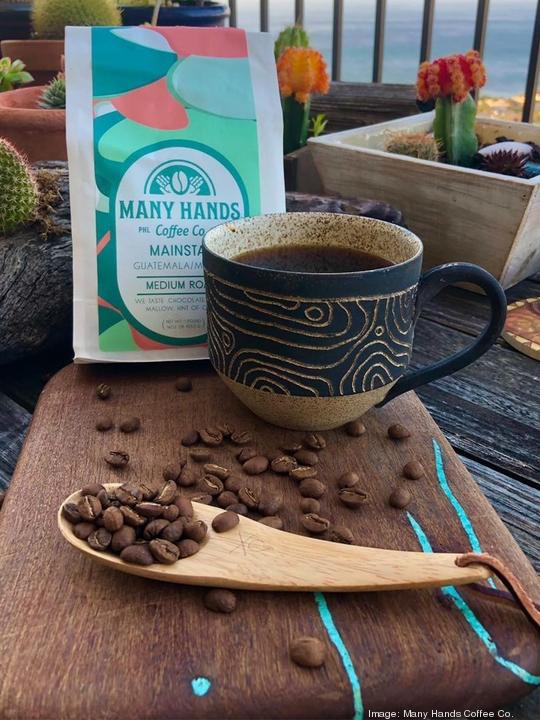
In January 2020, they formally filed paperwork for Many Hands Coffee Co. Around that time they had gotten a contract from the City of Philadelphia to vend at Love Park through their coffee truck – a vintage-inspired Citroen – but those plans were thwarted when the Covid-19 pandemic hit.
Though a setback, that time gave them the “opportunity to really interrogate our systems and really sit with every step of the supply chain and create our own sort of triple bottom line and our own vision of a more equitable coffee world,” Butler said.
Early last year, Many Hands relaunched and has gained popularity, thanks in part to its outpost in a shipping container at Love Park. It also vends from its truck outside of the Philadelphia Museum of Art three days a week.
To get the business going, several angel investors helped fund Many Hands for an undisclosed amount.
The company sources fair trade and organic coffee beans from locales such as Guatemala, Peru, Sumatra and Mexico, prioritizing women-owned coffee farms and production facilities.
When launching, Butler and Podlogar decided to give the brand an identity separate from Germantown Espresso Bar with the hopes that business would ripple beyond the neighborhood. Many Hands has established wholesale accounts with over a dozen companies across the city and is in talks to reach beyond the city limits.
Long-term, Butler hopes to see wholesale account for a majority of revenue, ideally being 75%, with the remaining 25% coming from direct-to-consumer sales.
Its bags of coffee are available as whole bean or different grounds and come in 1-pound and 5-pound bags. In keeping with its sustainability goals, Many Hands is packaged in a biodegradable bag with a soy-based biodegradable sticker.
So far, the company has roasted more than 3 tons of coffee beans.
Many Hands is available through e-commerce, retail sales through its coffee truck, as well as through local purveyors like Weavers Way Co-Op, Riverwards Produce, Avenues Café in Mount Airy, and Franny Lou’s Porch in the Fishtown/Kensington area. Beans are roasted and hand-packed in a facility on the 6300 block of Germantown Avenue.
At present, Many Hands has 10 employees, including its investors. As part of its business model, Many Hands pays baristas $15 an hour and donates 2% of sales to nonprofits and other organizations. It plans to grow that number as revenue increases.
Butler expects the company will see 30% to 50% year-over-year growth next year.
“I absolutely see that as a possibility,” Butler said. “All it takes is one big wholesale customer, like a hotel or someone to come knocking, and then suddenly it's like 100% growth. These numbers are not unheard of or impossible.”
What inspired the name?
The name really bloomed from the vision of the many hands it takes to make a great cup of coffee, but also many hands it takes to make a community. Our mission is to inspire universal equity in the coffee industry, from people, processing, producing, farming the coffee, but also our baristas.
How does your profit-sharing model work?
Anytime we sell our coffee, we break off 2% of overall sales to local nonprofits, charities, mutual aid funds, or families that might have come upon hard times. How we identify that organization is through either our own team if we're vending with our coffee truck, but then if it's a wholesale customer, we chat with that specific coffee shop, co-op, hotel, to then direct the 2% to [a local organization of their choosing].
Will you seek additional funding?
As we grow the vision, in the next few years, we'll likely be doing another call. … Two or three coffee trucks is not out of the realm.
